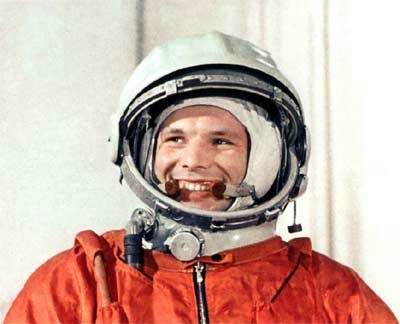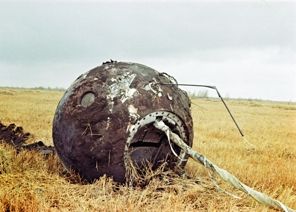 Yuri Gagarin, the first man in spaceOn April 1, 1961, on board Vostok 1, Soviet cosmonaut Yuri Gagarin made history when he became the first person in the world to enter space and to orbit the Earth.
Yuri Gagarin, the first man in spaceOn April 1, 1961, on board Vostok 1, Soviet cosmonaut Yuri Gagarin made history when he became the first person in the world to enter space and to orbit the Earth.
CHILDHOOD OF YURI GAGARIN
Yuri Gagarin was born in Klushino, a small village west of Moscow in Russia (then known as the Soviet Union). Yuri was the third of four children and spent his childhood on a collective farm where his father, Alexey Ivanovich Gagarin, worked as a carpenter and bricklayer and his mother, Anna Timofeyevna Gagarina, worked as a milkmaid.
In 1941, Yuri Gagarin was just seven years old when the Nazis invaded the Soviet Union. Life was difficult during the war and the Gagarins were kicked out of their home. The Nazis also sent Yuri's two sisters to Germany to work as forced laborers.
GAGARIN LEARNS TO FLY
In school, Yuri Gagarin loved both mathematics and physics. He continued on to a trade school, where he learned to be a metalworker and then went on to an industrial school. It was at the industrial school in Saratov that he joined a flying club. Gagarin learned quickly and was obviously at ease in a plane. He made his first solo flight in 1955.
Since Gagarin had discovered a love of flying, he joined the Soviet Air Force. Gagarin's skills led him to the Orenburg Aviation School where he learned to fly MiGs. On the same day he graduated from Orenburg with top honors in November 1957, Yuri Gagarin married his sweetheart, Valentina ("Valy") Ivanovna Goryacheva. (The couple eventually had two daughters together.)
After graduating, Gagarin was sent on some missions. However, while Gagarin enjoyed being a fighter pilot, what he really wanted to do was to go to space. Since he had been following the Soviet Union's progress in space flight, he was confident that soon they would be sending a man into space. He wanted to be that man; so he volunteered to be a cosmonaut.
GAGARIN APPLIES TO BE A COSMONAUT
Yuri Gagarin was just one of 3,000 applicants to be the first Soviet cosmonaut. Out of this large pool of applicants, just 20 were chosen in 1960 to be the Soviet Union's first cosmonauts; Gagarin was one of the 20.
During the extensive physical and psychological testing required of the chosen cosmonaut trainees, Gagarin excelled at the tests while maintaining a calm demeanor as well as his sense of humor. Later, Gagarin would be chosen to be the first man into space because of these skills. (It also helped that he was short in stature since Vostok 1's capsule was small.) Cosmonaut trainee Gherman Titov was chosen to be the backup in case Gagarin was unable to make the first space flight.
LAUNCH OF VOSTOK 1
On April 12, 1961, Yuri Gagarin boarded Vostok 1 at the Baikonur Cosmodrome. Although he was fully trained for the mission, no one knew if it was going to be a success or a failure. Gagarin was to be the very first human being in space, truly going where no man had gone before.
Minutes before the launch, Gagarin gave a speech, which included:
You must realize that it is hard to express my feeling now that the test for which we have been training long and passionately is at hand. I don't have to tell you what I felt when it was suggested that I should make this flight, the first in history. Was it joy? No, it was something more than that. Pride? No, it was not just pride. I felt great happiness. To be the first to enter the cosmos, to engage single handed in an unprecedented duel with nature - could anyone dream of anything greater than that? But immediately after that I thought of the tremendous responsibility I bore: to be the first to do what generations of people had dreamed of; to be the first to pave the way into space for mankind.
Vostok 1, with Yuri Gagarin inside, launched on schedule at 9:07 a.m. Moscow Time. Just after lift-off, Gagarin reputedly called out, "Poyekhali!" ("Off we go!")
Gagarin was rocketed into space, using an automated system. Gagarin did not control the spacecraft during his mission; however, in case of an emergency, Gagarin could have opened an envelope left on board for the override code. He was not given the controls to the spacecraft because many scientists were worried about the psychological effects of being in space (i.e. they were worried he would go mad).
After entering space, Gagarin completed a single orbit around Earth. The Vostok 1's top speed reached 28,260 kph (about 17,600 mph). At the end of the orbit, Vostok 1 reentered the Earth's atmosphere. When Vostok 1 was still about 7 km (4.35 miles) from the ground, Gagarin ejected (as planned) from the spacecraft and used a parachute to land safely.
 Vostok 1 spaceship capsuleFrom launch (at 9:07 a.m.) to Vostok 1 touching down on the ground (10:55 a.m.) was 108 minutes, a number often used to describe this mission. Gagarin landed safely with his parachute about ten minutes after Vostok 1. The calculation of 108 minutes is used because the fact that Gagarin ejected from the spacecraft and parachuted to the ground was kept secret for many years. (The Soviets did this to get around a technicality about how flights were officially recognized at the time.)
Vostok 1 spaceship capsuleFrom launch (at 9:07 a.m.) to Vostok 1 touching down on the ground (10:55 a.m.) was 108 minutes, a number often used to describe this mission. Gagarin landed safely with his parachute about ten minutes after Vostok 1. The calculation of 108 minutes is used because the fact that Gagarin ejected from the spacecraft and parachuted to the ground was kept secret for many years. (The Soviets did this to get around a technicality about how flights were officially recognized at the time.)
Right before Gagarin landed (near the village of Uzmoriye, Saratov Oblast, Russia), a local farmer and her daughter spotted Gagarin floating down with his parachute. Once on the ground, Gagarin, dressed in an orange spacesuit and wearing a large white helmet, terrified the two women. It took Gagarin a few minutes to convince them that he too was Russian and to direct him to the nearest phone.
GAGARIN RETURNS A HERO
Nearly as soon as Gagarin's feet touched the ground back on Earth, he became an international hero. His accomplishment was known around the globe. He had accomplished what no other human being had ever done before. Yuri Gagarin's successful flight into space paved the way for all future space exploration.
GAGARIN'S EARLY DEATH
After his successful first flight into space, Gagarin never again was sent into space. Instead, he helped train future cosmonauts. On March 27, 1968, Gagarin was test-piloting a MiG-15 fighter jet when the plane plummeted to the ground, killing Gagarin instantly.
No one is quite sure exactly what went wrong during the deadly test flight. For decades, people have speculated about how Gagarin, an experienced pilot, could safely fly to space and back but die during a routine flight. Some thought he was drunk. Others believed that Soviet leader Leonid Brezhnev wanted Gagarin dead because he was jealous of the cosmonaut's fame. Although new evidence and theories keep appearing, no definitive answer has yet been found.
What is known is that Yuri Gagarin's death at the young age of 34 deprived the world of a hero.
Since the first historical flight into space April 12 was celebrated as Cosmonaut's Day in the USSR and later in CIS countries.
 В Атырау -10
В Атырау -10